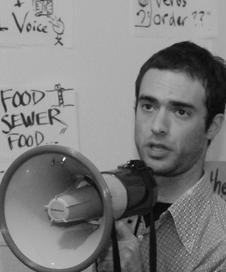Tongues Bloody Tongues
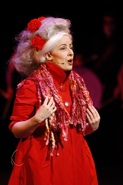
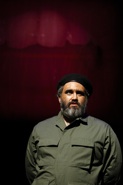
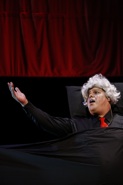
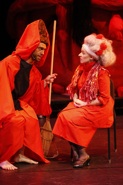
I began writing the libretto for Tongues Bloody Tongues in early 2007, days after Saddam Hussein's execution. The opera attempts to tell the story of Iraq, with a fictionalized Saddam narrating and conducting the orchestra and unreliably re-imagining six thousand years.
Two parts of it have been performed, in collaboration with Killsonic --
"11 July 1926" at REDCAT, July 2010
"An American Man From Iraq" at Micro-Fest: Los Angeles, Dec. 2010
Press
soars on wings of absurdity
-- Los Angeles Times
obstreperous, no-holds-barred
-- LA Weekly
a reconstituted Saddam Hussein giving a lecture about British diplomat and spy Gertrude Bell - all accompanied by a brass band numbering in the dozens
-- Los Angeles Times
breaking the mold of traditional theatre performances
-- L.A. Record
captivates audiences with a menacing portrayal of Gertrude Bell's story in Iraq
-- Big Smile Magazine
This experimental opera of cacophonous and fantastical proportions will be EPIC
-- Notes on Looking
An Explanation
[This is part of an interview I did right before the REDCAT performance. It wasn't ever published because the magazine's web site was hacked that same week.]
Describe Tongues Bloody Tongues and the excerpt/stage adaptation you brought to REDCAT for NOWFest.
Tongues Bloody Tongues is an opera about the history of Iraq, told over a few thousand years, with Saddam Hussein narrating and conducting the orchestra and generally re-imagining it all, mostly unreliably. The Tower of Babel is the unifying metaphor. Originally we wanted to do it as a parade, with the audience following floats down the street. The excerpt we did on stage at the NOW Festival is about Gertrude Bell and the beginning of the modern state of Iraq.
When did you become interested in Gertrude Bell? What compels you about her work and her story?
I heard a radio news story about Gertrude Bell a few years ago, by accident. And certain details - like her suicide in Baghdad - stuck with me. Later I read a couple of her biographies and she just seemed like such a complex character. She loved the Arab world and spent most of her life there, but she was also a tool of the British Empire. She was strong-willed, but with a weakness for men who were about to go off to war and die, or who were already married. Easily one of the most powerful women ever, right behind Elizabeth and Victoria, but ultimately she was really lonely. Her section in Tongues Bloody Tongues is supposed to be a way of making sense of her. Through Saddam Hussein's eyes, of course.
What is your relationship to Babylon and to the Tower? What draws you to that part of the world, to that story?
The Tower of Babel is a universal story and every culture has some version of it, even outside the Bible. The divergence of languages somehow being linked to the construction of a giant building. And the more that I've read about the Tower of Babel, the more it has seemed like a perfect metaphor for Iraq itself - all the different languages, all the different armies rolling through there. That's why it's called Tongues Bloody Tongues. My personal thing for the Tower comes from having a job doing research in speech and language stuff. They say you should "write what you know," so that was part of it.
Was it difficult to cast/direct/write for Saddam Hussein? How are we to read the metaphor of Hussein as orchestral director?
We didn't hold auditions - I wrote the part with Mike Ibarra in mind. He leads Killsonic, and played Saddam Hussein at the NOW Festival. He was careful not to make this version of Saddam Hussein too charming or funny - we didn't want to do a South Park thing on it. But I also didn't want to paint Saddam as some evil mastermind, like both George Bushes used to do. Saddam Hussein is a complex figure, too - Gertrude Bell's not the only one. For me, he represents the worst in human audacity. He is the Tower of Babel himself!
There are a few ways to read the orchestra conductor thing. One is that maybe Saddam is in Islamic purgatory - the barzakh - and he's making up the whole opera as he's looking back on his life and all of history. Or maybe Killsonic is having our revenge on him, by portraying Saddam as an ignorant and prejudiced buffoon. The secret reading that only we know is that it's all an allegory for Killsonic, for ourselves and our personal lives.
Is Tongues Bloody Tongues a political piece? What does Killsonic want to say about Iraq? Have you been speaking about/considering the war in previous performances?
It's definitely political, yeah. But it isn't heavy-handed. It's meant to remind Americans about how it all got the way it is now, to show that what's happening in Iraq today is nothing new, that it's the same mistakes all over again. And it's meant to show both sides of the exploitation - both against Iraqis and by them. No one is innocent, but no one is an evil supervillain either. We've done some political stuff before - one of the best and oldest Killsonic tunes is called "Liberation Technology" - but never anything like this. And in a way it's not really political at all. It's just as much about the mundane lives of historical figures - Gertrude Bell's love life! In a way it's just a love story.
Do you believe absurdity can be a political act? In your opinion, what's the most absurd element of Tongues Bloody Tongues? What is your most absurd habit/desire/Killsonic story/Tongues Bloody Tongues moment?
Anything can be a political act. Is Tongues Bloody Tongues absurd? Maybe. Absurdism means that you're trying to find meaning in the universe and failing badly. And Tongues Bloody Tongues is hard to understand, but it isn't meaningless. The most absurd part of Tongues Bloody Tongues - or at least the part that's the hardest to explain - is probably the parrots: we had a 15-voice women's choir for the NOW Festival, and at a couple of points they all had to make these loud parrot squawks to interrupt Saddam Hussein's opening monologue.
.
